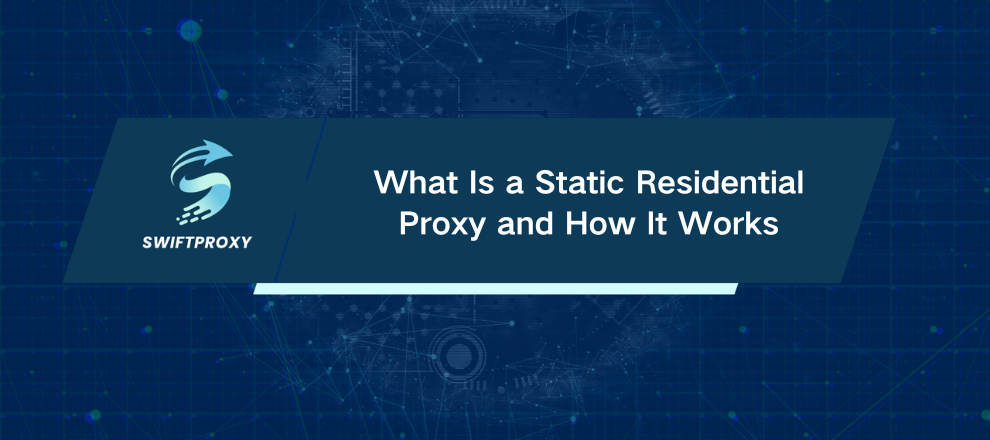What Is a Static Residential Proxy and How It Works
Ever tried accessing a website only to get blocked or flagged as a bot? Frustrating, right? That’s where static residential proxies come into play. They act like a trusted online identity—stable, reliable, and hard to detect. Choosing the right proxy is more than a tech decision; it’s strategic. One wrong move can disrupt social media campaigns, market research, or even streaming projects. This guide explores static residential proxies, explaining what they are, why they are important, and which providers lead the market in 2025. By the end, you will understand when to use them and how to choose the best provider for your project.

What Does a Static Residential Proxy Mean
A static residential proxy is a proxy server with a fixed, long-term IP address sourced from a real residential ISP. In simpler terms, it combines the credibility of a home internet user with the stability of a permanent IP.
Here's how it breaks down:
Proxy Server: Acts as a middleman between you and the target website. The website sees the proxy's IP, not yours. Instant anonymity.
Residential IP: These are genuine home IPs assigned by ISPs. Websites see your traffic as legitimate, reducing bans and flags.
Static Attribute: Your IP doesn't change. It's yours for weeks, months, or even longer—crucial for session management, account logins, or IP whitelisting.
How a Static Residential Proxy Works
Step 1: Configure the Proxy: Set up your static IP, port, and credentials in your software or browser.
Step 2: Route Traffic: All requests go through the proxy server instead of directly to the target site.
Step 3: Proxy Sends Request: The proxy makes the request using its fixed residential IP.
Step 4: Receive Response: The target site responds to the proxy, which then relays the data back to you.
The result? A perfect blend of stability, credibility, and low detection risk.
Main Benefits of Static Residential Proxies
Fixed IPs for stable connections
High anonymity from real residential ISPs
Accurate geolocation consistency
Broad compatibility with strict websites
Builds long-term IP reputation
Exclusive IPs for reliable service quality
Easier whitelisting and operational management
Who Uses Static Residential Proxies
Static residential proxies are popular across industries where stable and credible IPs matter:
Social Media Managers: Manage multiple accounts without triggering platform restrictions.
E-commerce Analysts: Monitor competitor pricing or inventory without being flagged.
Ad Verification Teams: Verify ads from different regions as real users would.
Travel and Ticket Platforms: Collect data from airline and hotel sites reliably.
Use Cases for Static Residential Proxies
Travel and Hotel Aggregation: Maintain uninterrupted access to real-time pricing and availability.
E-commerce Price Monitoring: Track competitors without IP bans.
Social Media Account Management: Keep accounts healthy with fixed, authentic IPs.
Ad Verification and Fraud Detection: Verify placement and detect fraudulent traffic with local IPs.
SEO Ranking Tracking: Monitor keyword rankings accurately from a fixed location.
Access to Restricted Content: Unlock geo-blocked streaming and news platforms reliably.
Static vs. Rotating Proxies
| Feature | Static Residential | Rotating Residential |
|---|---|---|
| IP Address | Fixed and exclusive | Rotates frequently |
| Advantage | Stability and credibility | Maximum anonymity |
| Use Cases | Social media, streaming, ad verification | Web scraping, competitor analysis |
| Session Management | Excellent | Poor |
| IP Whitelisting | Easy | Not feasible |
| Cost | Higher | Lower |
| Detection Risk | Low | Very low |
When to Use Static Proxies
E-commerce shopping and payments
Social media or ad account management
Streaming geo-restricted content
Long-term SEO tracking
Access to whitelisted systems
When to Use Rotating Proxies
Ticket purchasing
Large-scale web scraping
Competitor price scanning
Multi-region market research
Choosing a Static Residential Proxy
When selecting a provider, focus on these essentials:
Large, distributed residential IP pool
Flexible rental cycles and pricing
High connection success rate (≥98%)
Targeted IP locations (country, city, ISP)
API access and dashboards for management
24/7 customer support
Reputation and market validation
Always test providers with your own use case before committing. Quantitative data is your best friend here.
Trusted Static Residential Proxy Providers in 2025
Swiftproxy: 80M+ global IPs, 99.99% uptime.
ProxyEmpire: 9.5M+ IPs, beginner-friendly, reliable social media management.
NetNut: Hybrid network for high-traffic tasks, 1M+ static IPs.
Rayobyte: Clean, ethical proxies, strong support, ideal for sensitive operations.
Decodo (formerly Smartproxy): 115M+ IPs, optimized for speed and streaming.
Final Thoughts
Static residential proxies are a strategic asset. They provide stability, credibility, and low-risk access in an online environment increasingly sensitive to automation. Whether you're managing social media campaigns, performing market research, or streaming content globally, understanding and selecting the right proxy can make or break your project.

















































